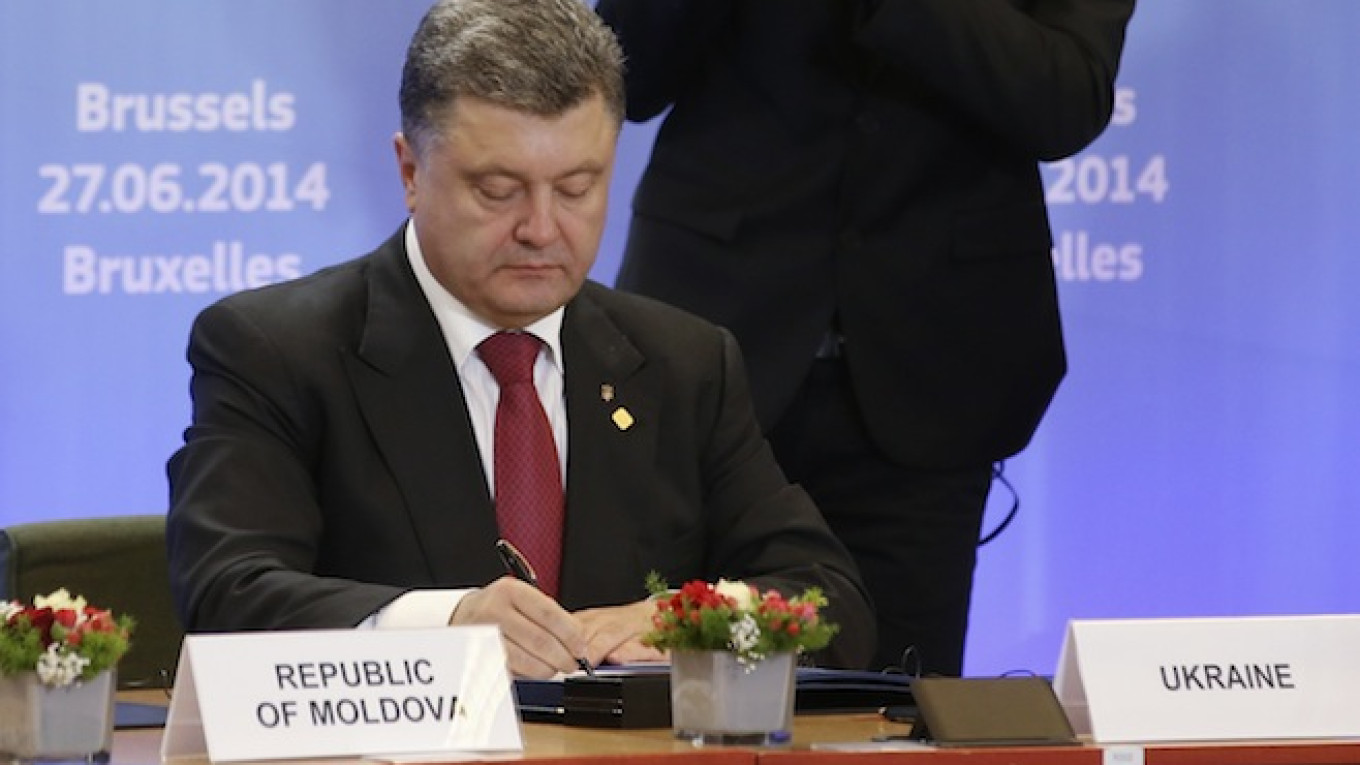Ukrainian President Petro Poroshenko won parliament's approval on Thursday to shake up the leadership of the armed forces as they struggle to end a rebellion by pro-Russian separatists.
Parliament endorsed Colonel-General Valeriy Heletey as defense minister after hearing Poroshenko describe the 46-year-old as a man "who will work day and night for restoring the military capability of our armed forces." He also named a new chief of the general staff.
Poroshenko took office last month with the country in crisis, as two eastern regions press demands to break away and join Russia, following the example of Crimea earlier this year.
After months of unsuccessful attempts to quash the uprising, he wants to sharpen the Army's effectiveness while exploring diplomatic options to end the crisis, which has revived East-West tensions in ways reminiscent of the Cold War.
Poroshenko on Monday rejected a further extension of a 10-day unilateral cease-fire in the east, where the government says 200 service personnel have been killed since the start of the conflict, as well as hundreds of civilians and rebels.
In Berlin on Wednesday the foreign ministers of Russia and Ukraine, after talks with German and French ministers, supported a further meeting of a "contact group" involving separatist leaders and aimed at trying to work out conditions for a more lasting cease-fire.
The group includes a former president of Ukraine, who is informally representing Kiev, Moscow's ambassador to Kiev, and a high-ranking official from the Organization for Security and Cooperation in Europe.
It should meet "no later than July 5 with the goal of reaching an unconditional and mutually agreed sustainable cease-fire," a document agreed by the four ministers said.
French President Francois Hollande and German Chancellor Angela Merkel urged President Vladimir Putin on Thursday to encourage the separatists to reach an agreement with the Ukrainian authorities, the French president's office said.
Deterring Aggression
Poroshenko, looking solemn and at times striking the table with his hand to make a point, did not mention the Berlin talks or the agreement on a possible new cease-fire, but put the emphasis instead on the need for a strong, reformed Army to defend Ukraine.
Heletey, who will replace acting defense minister Mykhailo Koval, would enact reforms to build an Army which would deter anybody "from planning aggression" against Ukraine, he said.
The new head of the general staff, 52-year-old Lieutenant-General Viktor Muzhenko, was until recently a top official in the "anti-terrorist operation" grouping the Army and other security bodies in the drive against the rebels.
Though Poroshenko won backing on the military shake-up, a debate on "decentralization" proposals for the regions, which is part of his peace plan, ran into trouble when a key coalition partner came out against them.
Overnight Attacks
In Donetsk, the main city of the east, where separatists have controlled key buildings since April, three traffic policemen were shot dead and one was wounded by gunmen in combat fatigues on Thursday, the Interior Ministry said.
Overnight, one Ukrainian soldier was killed when rebels approached in a car bearing a white flag and then opened fire, a military spokesman, Oleksiy Dmytrashkivsky, said.
The border service also said nine border guards were wounded in a rebel mortar attack on their post in Luhansk region on the border with Russia.
Poroshenko declared a week-long cease-fire on June 20 to give rebels time to lay down their weapons under an amnesty offered in his peace plan. He extended it by three days on June 27.
But on Monday he refused to prolong it on the advice of his security officials, who said the cease-fire had allowed rebels to regroup and rearm and had cost the lives of government troops.
Poroshenko's decision to relaunch operations against the rebels won U.S. support but harsh condemnation from Russia.
Moscow denies Poroshenko's charges that it is stoking the conflict by allowing arms and Russian mercenaries to pass across the joint border to reinforce the separatists.
Parliament was also scheduled on Thursday to hear Poroshenko's proposals for constitutional changes that will allow him to press a plan to devolve more powers to the regions.
By giving regions a greater say over their own affairs and finances, and by granting language rights to non-Ukrainian speakers, Poroshenko's "decentralization" plan aims to address grievances of Russian speakers in the east.
Poroshenko told parliament that the proposed changes would be a "powerful vaccine" against the idea of federalization for the east which is pushed by many separatists and pro-Russian politicians in Ukraine, but which the Kiev leadership sees as a first step to breakup of the country.
But the Fatherland party, a key coalition partner whose support Poroshenko requires, criticized the plan and further debate on it was postponed.?
See also:
A Message from The Moscow Times:
Dear readers,
We are facing unprecedented challenges. Russia's Prosecutor General's Office has designated The Moscow Times as an "undesirable" organization, criminalizing our work and putting our staff at risk of prosecution. This follows our earlier unjust labeling as a "foreign agent."
These actions are direct attempts to silence independent journalism in Russia. The authorities claim our work "discredits the decisions of the Russian leadership." We see things differently: we strive to provide accurate, unbiased reporting on Russia.
We, the journalists of The Moscow Times, refuse to be silenced. But to continue our work, we need your help.
Your support, no matter how small, makes a world of difference. If you can, please support us monthly starting from just $2. It's quick to set up, and every contribution makes a significant impact.
By supporting The Moscow Times, you're defending open, independent journalism in the face of repression. Thank you for standing with us.
Remind me later.


